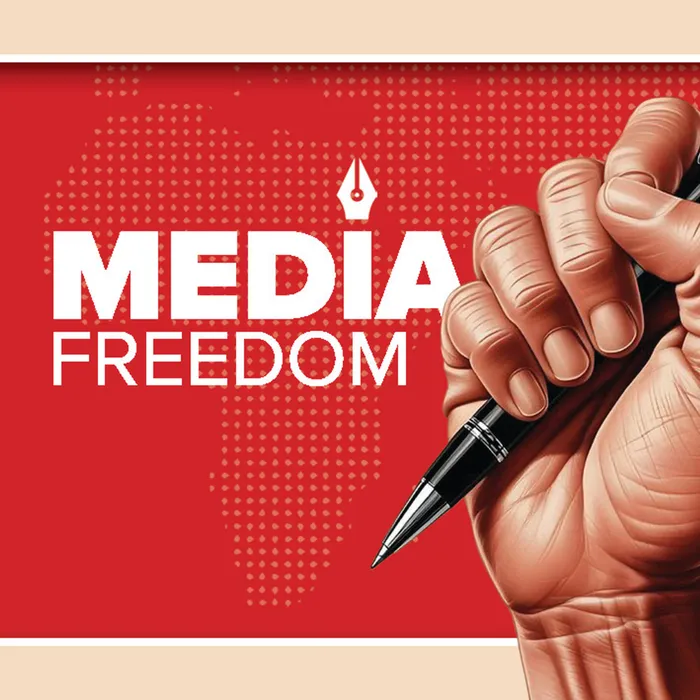Under Watch: Pakistan’s Journalists Struggle to Stay Afloat in a Sinking Democracy
PRESS FREEDOM

While the South African media still enjoys constitutional protections and a relatively free press environment, Pakistan’s journalists are battling to breathe amid a tightening noose drawn by military and intelligence institutions.
Image: Supplied
As South Africa continues its journey of democratic consolidation and media transformation, the situation in Pakistan serves as a chilling reminder of how press freedom can be slowly strangled under the guise of regulation and national security.
While the South African media still enjoys constitutional protections and a relatively free press environment, Pakistan’s journalists are battling to breathe amid a tightening noose drawn by military and intelligence institutions.
A recent report titled ''Intimidation on All Fronts: Press Freedom and Media Safety in Pakistan'', released ahead of World Press Freedom Day 2025, paints a grim picture.
Journalists in Pakistan face a growing array of threats: surveillance, legal intimidation, censorship, financial pressure, and in some cases, violent attacks. Despite constitutional guarantees, the freedom to report independently has become a high-risk act. Pakistan’s history of media repression is not new.
From the military regimes of Ayub Khan and Zia-ul-Haq to the more modern, media-savvy control strategies under Pervez Musharraf, the trend has remained the same — muzzle dissent and protect power.
The Pakistan Electronic Media Regulatory Authority, formed in 2002, was meant to regulate broadcast media. But over time, it has morphed into a weapon used to punish outlets and journalists who challenge the state narrative. Recent developments have added digital spaces to the list of controlled domains.
The Prevention of Electronic Crimes Act, initially aimed at curbing cybercrime, has often been misused to target online journalists and civil society voices. Amendments passed this year have broadened the state’s powers even further, allowing for arrests and censorship under vague definitions of “offensive content.”
During the 2024 general elections, media access was deliberately restricted. Entire regions, including the capital Islamabad, faced mobile and internet shutdowns, severely hampering election coverage. The Pakistan Telecommunication Authority, then under the command of a retired general, enforced these blackouts on instructions from the Ministry of Interior.
The timing raised serious concerns about transparency and the integrity of the electoral process.
One of the most alarming proposals is the creation of the Pakistan Media Development Authority. Critics argue that it would function more as a state enforcer than a media watchdog, with powers to shut down outlets and prosecute journalists in special tribunals. Such bodies, in a democracy, would be unthinkable.
But in Pakistan, they are becoming tools to silence critical reporting under a veil of legality. Economic pressure also plays a part. The government controls a large portion of advertising revenue, and this leverage is used to reward compliant media houses and starve those that refuse to toe the line.
Newspapers like *Dawn* and *Daily Sahafat*, which have maintained editorial independence, have faced sharp revenue cuts, while pro-government platforms remain well-funded.
But the financial and legal constraints pale in comparison to the physical dangers. Journalists are being harassed, abducted, or worse. In 2024 alone, seven journalists were killed.
These included well-known names like Khalil Jibran and Saad Ahmed, whose deaths have not led to meaningful investigations or justice. The case of Arshad Sharif, shot dead in Kenya after fleeing threats in Pakistan, remains a haunting symbol of the lengths to which journalists must go to avoid repression, only to meet violence abroad.
Women in the industry are also increasingly targeted. Javeria Siddique, the widow of Arshad Sharif and a journalist in her own right, has faced ongoing harassment both online and off. Such stories are no longer isolated incidents—they reflect a pattern.
The Pakistan Press Foundation documented 34 cases of physical assaults, digital threats, or kidnapping in just the first half of 2025.
Dozens of journalists have either been arrested or forced into exile. Even prominent figures like Imran Riaz Khan have been repeatedly detained for challenging state institutions, with little or no legal recourse. As South Africans, we should not look away.
The experiences of Pakistani journalists should remind us that the freedom to write, question, and investigate must never be taken for granted.
When military or political elites control narratives, societies lose not only their access to truth but also the accountability that keeps democracies alive.In a time where disinformation is rampant and authoritarian tactics are spreading across borders, the struggle of Pakistani journalists must be seen for what it is — a frontline battle for democracy. South Africa, with its hard-won media freedoms, must stand in solidarity with those who risk everything for the simple act of telling the truth.